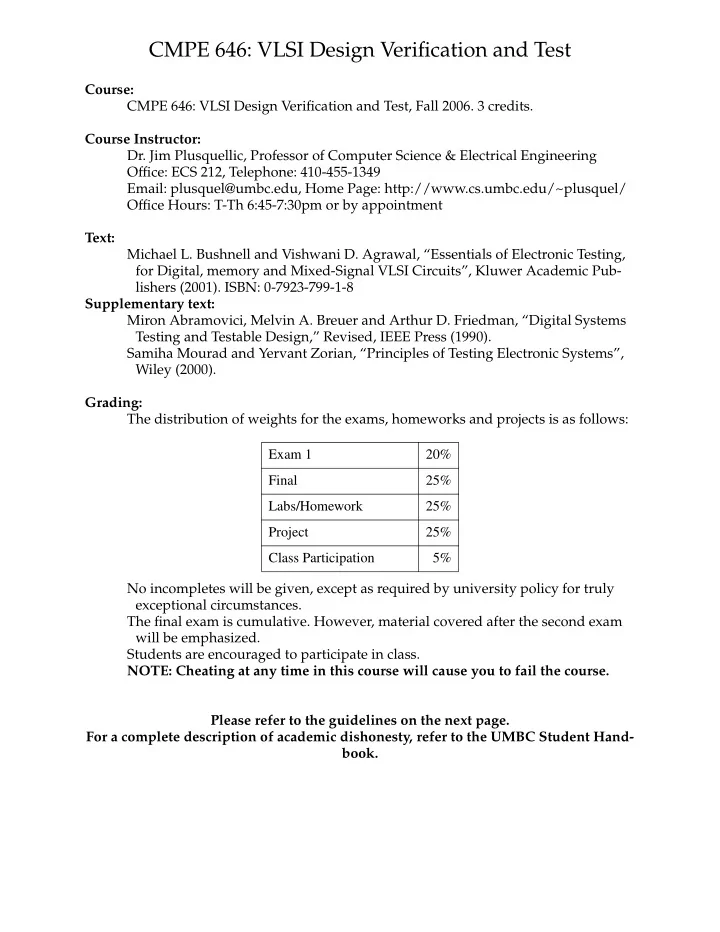

CMPE 646: VLSI Design Verification and Test Course: CMPE 646: VLSI Design Verification and Test, Fall 2006. 3 credits. Course Instructor: Dr. Jim Plusquellic, Professor of Computer Science & Electrical Engineering Office: ECS 212, Telephone: 410-455-1349 Email: plusquel@umbc.edu, Home Page: http://www.cs.umbc.edu/~plusquel/ Office Hours: T-Th 6:45-7:30pm or by appointment Text: Michael L. Bushnell and Vishwani D. Agrawal, “Essentials of Electronic Testing, for Digital, memory and Mixed-Signal VLSI Circuits”, Kluwer Academic Pub- lishers (2001). ISBN: 0-7923-799-1-8 Supplementary text: Miron Abramovici, Melvin A. Breuer and Arthur D. Friedman, “Digital Systems Testing and Testable Design,” Revised, IEEE Press (1990). Samiha Mourad and Yervant Zorian, “Principles of Testing Electronic Systems”, Wiley (2000). Grading: The distribution of weights for the exams, homeworks and projects is as follows: Exam 1 20% Final 25% Labs/Homework 25% Project 25% Class Participation 5% No incompletes will be given, except as required by university policy for truly exceptional circumstances. The final exam is cumulative. However, material covered after the second exam will be emphasized. Students are encouraged to participate in class. NOTE: Cheating at any time in this course will cause you to fail the course. Please refer to the guidelines on the next page. For a complete description of academic dishonesty, refer to the UMBC Student Hand- book.
CMPE 646: VLSI Design Verification and Test The following is taken from the UMBC Student Handbook: DEFINITIONS OF ACADEMIC MISCONDUCT Academic misconduct may include but is not limited to the following: Cheating: knowingly using or attempting to use unauthorized material, informa- tion, or study aids in any academic exercise. Fabrication: Intentional and unauthorized falsification or invention of any infor- mation or citation in an academic exercise. Facilitating Academic Dishonesty: Intentionally or knowingly helping or attempt- ing to help another commit an act of academic dishonesty. Plagiarism: Knowingly representing the words or ideas of another as one’s own in any academic exercise, including works of art and computer-generated informa- tion/images. POLICY FOR RESOLVING CASES OF ACADEMIC MISCONDUCT Individual faculty members have the right and responsibility to deal directly with any cases of academic misconduct which arise in their courses. Instances of academic mis- conduct may be identified in one of two ways. If a faculty member believes a student has committed an act of academic misconduct--for example, by direct observation of student behavior, by comparing the contents of an assignment with that submitted by another student, or by reviewing notated sources or references--the faculty member, in consulta- tion with the Chair of the Academic Conduct Committee, will assess the student’s alleged misconduct and the faculty member’s options. If a student believes that aca- demic misconduct has occurred, the student will notify either the faculty member or the Chair of the Academic Conduct Committee. It is particularly important that the Chair of the Academic Conduct Committee be consulted. The Chair can provide knowledge and insight for the faculty member. Com- munication of instances of academic misconduct also protects the integrity of the uni- versity by providing a means of recording infractions that may be repeated by a particular student, or which may prove endemic to a particular course or department. Consultation with the Chair of the Academic Conduct Committee provides a formal record of the infraction and resolution, protecting the student, professor, and university should any questions later arise. The student will have the opportunity to respond to an accusation of academic mis- conduct.
CMPE 646: VLSI Design Verification and Test Tentative Course Outline: Date Topic week 1 (intro) Introduction week 2 (overview & economics) VLSI Testing Process , Equipment and Economics week 2 (defects) Defects week 3 (defectsx) Defects week 3 (faultsx) Faults week 4 (faultsx) Fault Models week 4 (delay_faultsx) Delay Faults week 5 (delay_faultsx) Delay Faults week 5 (combinational_atpgx) Combinational ATPG week 6 (combinational_atpgx) Combinational ATPG week 6 (combinational_atpgx) Combinational ATPG week 7 (testability_measures) Testability Measures week 7 Exam I week 8 (sequential_atpgx) Sequential ATPG week 8 (sequential_atpgx) Sequential ATPG week 9 (tbd) (conference) week 9 (tbd) (conference) week 10 (simulationx) Simulation week 10 (fault_simulationx) Fault Simulation week 11 (defect_basedx) Defect-Based Testing week 11 (dftx) DFT week 12 (dftx) DFT week 12 (bistx) BIST week 13 (bistx) BIST week 13 (bistx) BIST week 14 Advanced Topics week 14 Advanced Topics week 15 Final Exam (Note: Changes/Additions to this schedule will be posted on my web site http://www.cs.umbc.edu/~plusquel/)
Recommend
More recommend